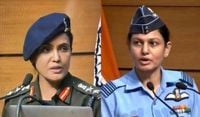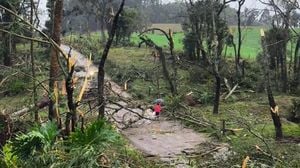Colonel Sofia Quraishi’s commanding presence at the media briefing following Operation Sindoor wasn’t just symbolic — it was emblematic of a changing era in Indian defense leadership. As she addressed the nation and the world with composure and authority, she became the face of a powerful narrative: the evolving role of women in India’s armed forces.
Born in 1974 in Gujarat’s Vadodara, into a family with military lineage, Quraishi has carved her own legacy in a field historically dominated by men. Her journey, spanning battlefield exploits and global peace missions, showcases not only competence but quiet determination and resilience. Sophia Qureshi, the name that echoed through newsrooms on May 8, is now a beacon for a generation inspired by grit and service.
Commissioned into the Indian Army Corps of Signals in 1999, Quraishi carries a story marked by groundbreaking achievements and historic firsts. From her early days in Vadodara, where her grandfather served as a religious teacher in the army, she seemed destined for the olive green. After earning a master’s degree in Biochemistry from Maharaja Sayajirao University in 1997, she took the unconventional path to military service, an uncommon route for women of her time.
Her first major recognition came during Operation Parakram, India’s military mobilization post the 2001 Parliament attacks. Stationed along the Punjab border, Quraishi’s communication expertise proved invaluable. For her exceptional performance, she received the prestigious GOC-in-C Commendation Card. Her technical skills in securing communication under stress earned admiration across ranks, setting her apart early in her career.
But it was in 2016 that Quraishi’s leadership catapulted her into international attention. As the first Indian woman to lead an Indian contingent at the ASEAN Plus Multinational Military Exercise “Force 18”, she wasn’t just participating — she was commanding. Out of 18 participating countries, she was the only woman commander, a moment that broke long-standing stereotypes and brought the spotlight to India’s inclusive military evolution.
On May 8, 2025, India responded to the brutal April 22 Pahalgam terror attack, which claimed 26 lives, with surgical precision. Between 1.05 am and 1.30 am, Operation Sindoor targeted nine terrorist camps in Pakistan and Pakistan-occupied Kashmir. The operation marked a pivotal counterterrorism step, and Col Quraishi was at the helm of its post-strike communication strategy.
Following Foreign Secretary Vikram Misri’s briefing, Col Quraishi and Wing Commander Vyomika Singh addressed the press, outlining the targets and intelligence validation. “The nine terror sites were chosen based on credible intelligence and their involvement in cross-border terrorism,” said Col Quraishi, reaffirming India’s commitment to zero tolerance on terror networks. This wasn’t Quraishi’s first time managing crisis communication, but it certainly was her most high-profile role yet.
Her presence not only added legitimacy to the military narrative but also highlighted the operational capabilities of women officers in handling both frontline and strategic duties. Colonel Quraishi’s expertise is not confined to combat or strategy alone. Between 2006 and 2012, she served in the United Nations Peacekeeping Operations in Congo. Over her six-year tenure, she was involved in efforts to stabilize conflict-ridden zones and facilitate humanitarian relief.
This extended deployment honed her diplomacy skills and deepened her understanding of multinational cooperation in security matters. Back home, her leadership was instrumental in flood relief operations in Northeast India. During the crisis, her knowledge in critical communication systems ensured seamless coordination between civil and military units. Her efforts earned her another commendation, this time from the Signal Officer-in-Chief (SO-in-C).
Colonel Quraishi’s personal and professional life reflects a seamless blend of tradition and progress. Married to a fellow officer in the Mechanised Infantry, she balances roles with dignity and discipline. Her career has often intersected with cultural conversations around gender roles in the armed forces. Through her visibility and performance, she continues to challenge archaic narratives, advocating for equal opportunity based on merit and skill.
Her rise within a regiment known for its technical rigour is also testament to the evolving policies in the Indian military that support and empower capable women officers to aspire and lead at every echelon. Col Quraishi has been featured in several national defense forums, military journals, and leadership panels. Her story has also become part of academic discussions around gender inclusivity in defense studies across Indian universities.
Her speeches, particularly on leadership and resilience, have inspired cadets at the National Defence Academy and officers at the Defence Services Staff College. In Gujarat, her home state, she has been recognized as a symbol of courage and competence. Public statements from the Gujarat government often highlight her legacy, with initiatives to encourage young women in the state to explore careers in defense through scholarship programs and awareness drives named in her honor.
Colonel Sofia Quraishi represents more than individual excellence. She stands for a paradigm shift — in policy, perception, and practice. With military reforms enabling broader roles for women and geopolitical scenarios demanding sharper, inclusive strategies, officers like her are shaping a new military ethos.
As the digital age ushers in new forms of warfare and diplomacy, having leaders with holistic experience — from frontline duties to global peacekeeping — becomes critical. Quraishi’s journey thus far signals just the beginning of what promises to be a lasting impact on India’s defense strategy and societal norms.





